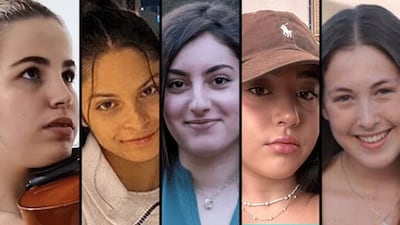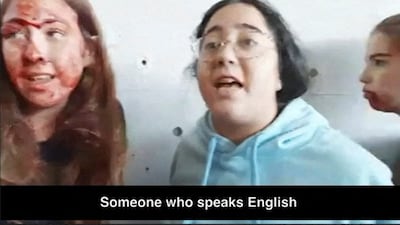Live updates: Follow the latest on Israel-Gaza
Israeli authorities are under increasing pressure to secure the release of the hostages still held in Gaza, after a video that shows soldiers taken captive by Hamas was broadcast on TV.
The footage was released by the Hostages and Missing Families Forum, a volunteer organisation that is focused on the return of hostages taken to Gaza by Hamas militants on October 7.
The video has been shared by Israel's official social media accounts and appears to show five women, two with bloodied faces, held captive and surrounded by Hamas militants.
"Those are the ones who have been killing our brothers," one of the militants says in the video. Others ask the women where they are from and who they want to call.
Israel has named the women as Liri Albag, Karina Ariev, Agam Berger, Daniela Gilboa and Naama Levy. They were all serving in the military when they were captured at the Nahal Oz military base, Israel's war cabinet minister Benny Gantz said, adding that his "stomach turned" when he saw the footage.

Israel said the families of the five women approved the release of the footage "to raise awareness about the horrors their daughters are facing as hostages in Gaza".
The forum said the video showed the "violent, humiliating and traumatising treatment" the women have faced in captivity.
Ayelet Levy, mother of Naama Levy, said her daughter looked "terrified and wounded". "There is fear in her eyes ... she is begging for her life," Ms Levy said. "The top priority is to bring her home, bring them all home now."
Mistranslations
Arabic speakers said the video contained incorrect translations and misleading subtitles. In the footage, subtitles suggest the militants describe the soldiers as "women who can get pregnant". But the word used is "sabaya", which in Arabic means women, colloquially, or female prisoners of war, in Islamic terminology.
The subtitles also include the term "Zionists", despite the word not being heard in the audio. A militant is also quoted in the subtitles as saying "you are beautiful", but those words are not spoken in the video.
About two and a half minutes into the footage, someone off camera says "balle", which means bring her up, but the subtitles translate the term to "without her".
A Palestinian activist known online as Younis Tirawi pointed out some of the misleading subtitles in the footage and accused Israel of "sexualising" its female soldiers and using them as "propaganda material".
In a statement, Hamas called the video "fragmented and manipulated". It said the soldiers captured were on their day off as October 7 fell on a Saturday, which is a holiday in Israel.
Hamas also said the mistranslation and addition of words not spoken by the militants "proves that the Zionist narrative is false in its origins".
The group added the "minor injuries" suffered by the soldiers "is expected" in operations such as the one carried out on October 7.
"The female soldiers were treated in accordance with the ethical rules of our resistance and no mistreatment for them in this unit was proven," the statement said.
Mounting pressure
About 1,200 people were killed and 240 taken hostage in the Hamas-led attack on southern Israel on October 7. Israel's retaliatory bombardment of Gaza has killed more than 35,700 Palestinians and injured tens of thousands.
A week-long pause in the war in late November included the release 105 hostages from Gaza, in exchange for 240 Palestinian detainees in Israel.
Around 120 hostages are thought to remain in Gaza, although it is unclear how many have since been killed in fighting or Israeli air strikes.
Israeli Prime Minister Benjamin Netanyahu has come under intense domestic pressure to prioritise the release of the hostages as part of a ceasefire deal, with families of those held captive leading protests against his government.
Protests over the issue have become increasingly heated, with some resulting in heavy-handed responses by the police.
But Israel's far-right cabinet members and their supporters have pushed for Mr Netanyahu to continue the war effort until "total victory" is achieved. That includes an offensive on Rafah, in southern Gaza, where more than a million people sought refuge from the conflict.
Israeli analyst and pollster Dahlia Scheindlin told The National that "from survey research and public polls we do see that over the past few weeks the Israeli public increasingly prioritises hostage release over specific developments in the war".
She is nonetheless sceptical that Wednesday's video will be enough to convince the government to change course.
"Over eight months we’ve seen emotional videos of hostages being released, the testimony of Amit Soussana and the killing of the three hostages," Ms Scheindlin said.
"Any one of these should have been a breaking point for the public, for the sense that hostage release should be of the utmost urgency at the expense of other war aims, and yet it hasn’t happened."


